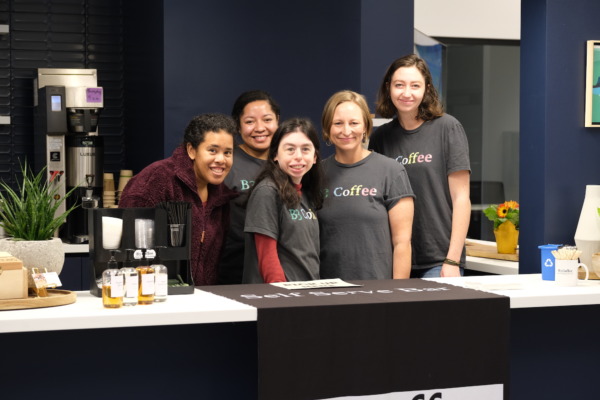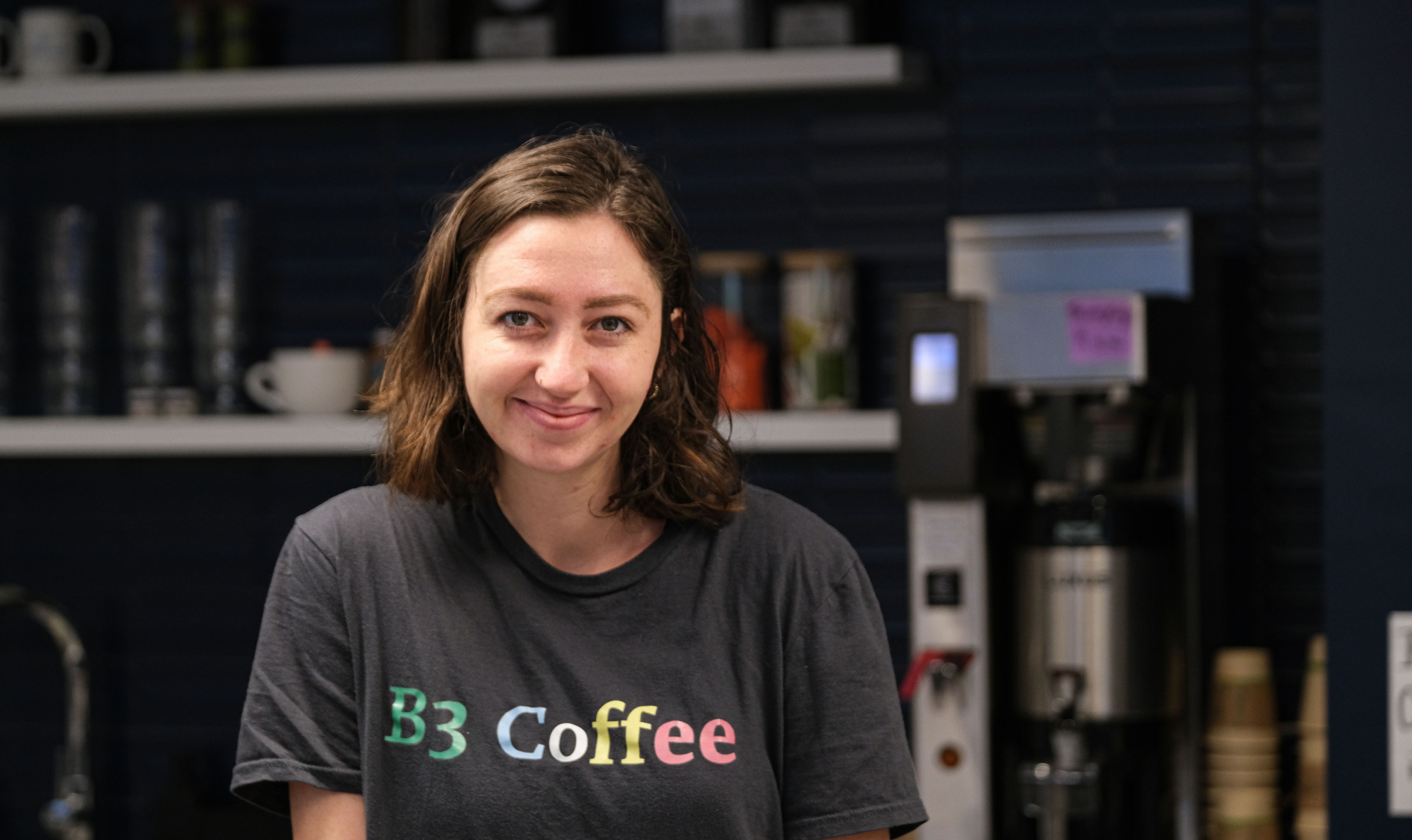Jacklyn Boheler traces her passion for working with people with intellectual and developmental disabilities (IDD) back to her childhood. From an early age, she felt a natural connection to the neurodivergent community.
“Working with people with disabilities has been a constant in my life,” Boheler said. “The disability community has always drawn me in, and I’ve found a natural connection with individuals who are neurodivergent, as I later discovered my own neurodivergence, adding a personal dimension to my affinity for this community.”
At UNC-Chapel Hill, she discovered the UNC School of Education’s Human Development and Family Science (HDFS) program, which offered a community-focused foundation, unlocking opportunities for various career paths and graduate programs in the helping professions. During college, Boheler volunteered for programs that advocate for disability allyship and accessible services for neurodiverse groups, one being Best Buddies, a program that pairs UNC students with members of the Chapel Hill community who have intellectual and developmental disabilities to facilitate lasting connections.
While she gained key skills during these experiences, she also saw service gaps and disparities in adult support systems, especially in transition after graduation. Boheler’s engagement with programs like Best Buddies, and her experience as a barista at an on-campus coffee shop became pivotal in shaping her vision. Working at the coffee shop provided not just a job but a sense of belonging and a diverse social circle to many employees.
It was here that Boheler discovered the organic nature of community building. Coffee emerged as a powerful catalyst in facilitating these meaningful connections. Motivated by the desire to create an authentic and mutually beneficial community, Boheler partnered with Best Buddies to establish B3 Coffee (initially Best Buddies Brews) in 2018. The nonprofit utilizes coffee to provide social and vocational opportunities for people of all abilities while organizing pop-ups at conferences, local programs, and on-campus events.
“At B3, our priority is creating a strong sense of community and belonging for our members,” Boheler said. “We strive to be responsive to what our members want and need, so they feel empowered to shape the organization into something meaningful for them. The ‘glue’ that bonds us is the collaborative spirit of co-creating an inclusive space together.”
For Boheler, who now serves as the executive director of B3 Coffee, breaking down stigma begins with the representation of disabled individuals in dignified roles, providing opportunities for genuine interaction, and the development of authentic relationships.
“It’s crucial for anyone in a helping role to understand the disability experience, as it builds cultural humility,” Boheler said. “Many human service professionals fall short in truly supporting this community. My time witnessing experiences of the IDD community first-hand taught me the importance of seeing disability as a culture requiring a stance of curiosity and allyship.”
Through fieldwork experiences and program development within B3 Coffee, Boheler had the opportunity to blend her interests seamlessly, all while emphasizing the importance of a neurodiversity-affirming lens in her work.
“Our identity comes from the connections we build as a community — that’s what it’s all about,” Boheler said. “By listening to our members and prioritizing their goals, we can foster a community where everyone feels recognized and valued.”
Expanding a culture of inclusivity
In 2015, Boheler entered the School’s HDFS program, and within the program, interned at the UNC TEACCH Autism Program, where she now works full-time. In conjunction with her experience in the HDFS program, Boheler’s internship provided her with hands-on interactions with individuals with disabilities and their families.
During the internship, Boheler contributed to the development of programs centered around life skills and work readiness for autistic individuals. This experience was not only instrumental in enabling her to develop impactful programs for B3 Coffee, but also served as a foundational cornerstone for her broader advocacy and commitment to fostering inclusivity within the neurodivergent community.
“In the HDFS program, I gained an understanding of family systems and learned to perceive individuals in interaction with their broader social and economic contexts,” Boheler said. “The coursework, complemented by real-life experiences that resonated with my learning style, provided me with valuable insights. I was educated on many issues around ethics, human services, and how to navigate diverse cultures and experiences.”
After graduation, Boheler embarked on a master’s degree in occupational therapy, completing it in 2021. For Boheler, the experiential learning experiences supported by the HDFS program proved transformative, providing significant preparation for her entry into her OT program.
During her time in the OT program and working to cultivate B3 Coffee, Boheler expanded her work to advocate for individuals with intellectual and developmental disabilities. In December 2020, Boheler co-founded OTs for Neurodiversity, a social media movement advancing a neurodiversity paradigm in occupational therapy. In this, Boheler worked to create content and tools shaped by insights from neurodivergent adults, offering consultations and training on strengths-based practices.
“Professions like occupational therapy have historically been influenced by behavioral and medical models,” Boheler said. “I challenge this influence, particularly in the context of individuals with lifelong disabilities, where a rehabilitation approach may not be applicable. My focus remains on supporting individuals to thrive as their most authentic selves, recognizing the limitations of traditional models.”
B3 Coffee offers a diverse range of programs designed to empower individuals in various aspects of their lives. Some of these programs include “Belonging in the Workplace,” a program designed to support work readiness and exploration. The program teaches essential topics like self-advocacy and resume building, incorporating interactive role-playing to navigate tricky communication scenarios in the workplace.
Another program, “Living Your Best Life,” holistically addresses the dimensions of the transition to adulthood, offering hands-on experiences in budgeting, navigating public transit, meal planning, and organizational strategies for daily life. Additionally, B3 Coffee recently launched the “Navigating the Digital World” program, which delves into assistive technology, assistive technology, computer literacy, and digital tools for daily life.
“We have a lot involved in our programs, which I consider a ‘sample platter’ including diverse skill areas key to adulthood,” Boheler said. “This approach not only allows our members to build confidence but also fosters a spirit of curiosity and exploration, making the experience exceptionally enjoyable.”
This past September, B3 began a partnership with the Innovate Carolina Junction, a newly opened space that houses Innovate Carolina – the University’s central team for innovation, entrepreneurship, and economic development — and is open to local and regional entrepreneurial and business communities.
B3’s partnership with the Junction involves an on-site coffee catering service, available to book for special events, and a self-serve bar featuring “B3 Blend” for Junction members. B3 is also in the process of trialing a full-service café model in the building’s lobby area, which would offer consistent hours to UNC’s campus community.
Boheler also emphasizes B3 Coffee’s model of fostering a sense of community through various social activities, such as a weekly art class and an inclusive book club that employs a multimodal approach to literacy. These activities not only provide opportunities for skill-building and self-expression but also contribute to the vibrant tapestry of inclusivity that defines B3’s unique community culture.
“What truly sets B3 apart is our commitment to being led by the individuals we serve,” Boheler said. “The nature of B3’s work is evolving, shaped by feedback from our members. This process informs our initiatives, ensuring they align with the desires and goals expressed by our community.”

Transformative allyship and accessibility
Boheler’s experiences within the School, and Carolina as a whole, serve as a foundation for her commitment to community-based roles and empowering others through B3 Coffee, uniting her dedication to working with individuals with disabilities and furthering inclusivity.
“Being associated with the School of Education offered interesting insights into the education system, unveiling both concrete barriers and support structures for individuals with disabilities,” Boheler said.
As a project coordinator for UNC TEACCH Autism Program’s grant-funded Work Together NC (NC Community Collaboration for Employment), Boheler is dismantling barriers and optimizing accessibility of adult services for neurodiverse populations with a particular emphasis on improving support for multiply minoritized groups. Through this work, she leads the development of a statewide “IDD Inclusive Employment Alliance,” offering training and recognition to employers interested in a disability-inclusive workforce.
In addition, Boheler utilizes her voice and expertise, serving as a keynote and guest speaker at conferences and programs dedicated to advancing community awareness about neurodiversity, fostering disability allyship, and promoting workplace inclusion, converging harmoniously with her efforts at B3 Coffee, where she actively contributes to creating a supportive, inclusive, and accessible community for individuals with intellectual and developmental disabilities.
Also, since 2018, Boheler has served on the steering committee of the Carolina Institute for Developmental Disabilities, focusing on the inclusive postsecondary program, aligning with her commitment to holistic education and employment support.
“I’m really looking forward to seeing where B3 goes in the future,” Boheler said. “Utilizing my background in occupational therapy, a major focus is on expanding and tailoring our programs to meet the diverse needs of our members. I’m excited to see how B3 can continue to engage with the UNC community.”
Boheler hopes B3 Coffee will someday have a dedicated space for programming and transitional employment. She looks forward to nurturing community on campus through new locations like the Innovate Carolina Junction. Above all, Boheler is driven by her passion for neurodiversity and empowering individuals with intellectual developmental disabilities.
“B3 has transformed beyond a coffee stand, expanding into diverse programs,” Boheler said. “This organization functions as a transitional employment model, supporting the professional development of our members. At B3, we don’t just operate programs – we live life together.”
To learn more about B3 Coffee, visit b3coffee.org.
To learn more about Work Together NC visit worktogethernc.com.
Learn more about OTs for Neurodiversity on Instagram.
